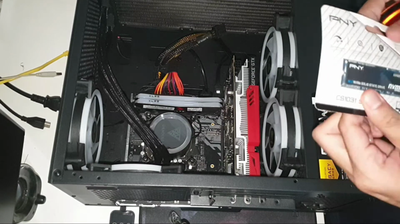
Using the PNY CS1030 1TB M.2 NVMe Gen3 SSD M280CS1030-1TB-RB (2024)
My thoughts on using the PNY CS1030 1TB M.2 NVMe SSD: performance and storage upgrade.
Introduction
The PNY CS1030 M.2 NVMe SSD is a significant upgrade to what I was using before (SATA drives). After reading up on NVMe technology, I was curious to see if I would see a noticable differences. The simple installation process and the immediate boost in speed was easy and noticable - one of my best decisions in terms of tech upgrades.
Some photos (click to enlarge)
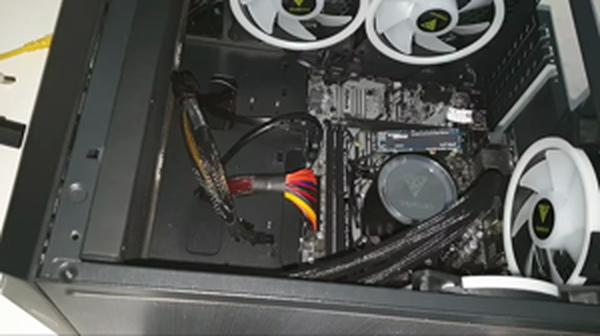
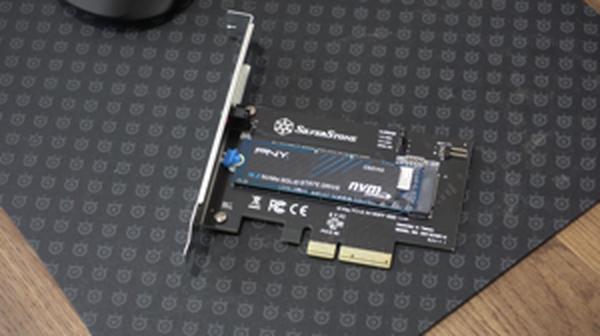
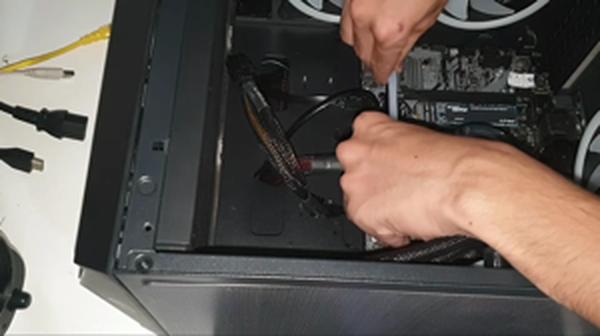
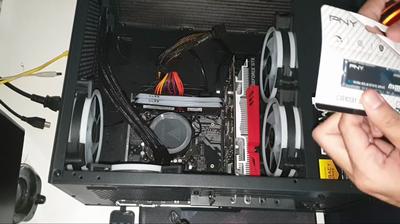
Specs of the PNY CS1030 1TB M 2 NVMe Gen3 SSD M280CS1030-1TB-RB
- Release Year
- Brand
- Compatible Devices
- Color
- Connectivity Technology
- Digital Storage Capacity
- Hard Disk Form Factor
- Hard Disk Description
- Hard Disk Interface
- Installation Type
- Special Feature
Prices
Upgrading to NVMe: A Leap in Performance
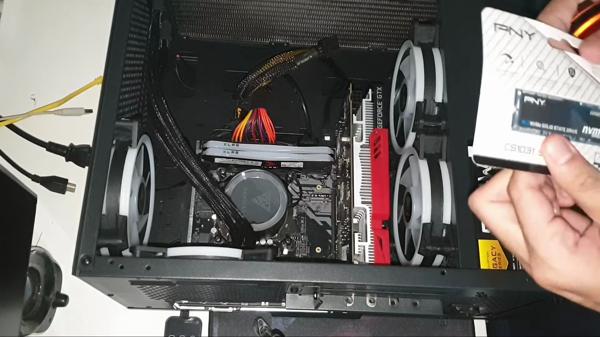
Making the switch to an NVMe SSD, like the PNY CS1030, definitely feels like stepping into the future of storage technology. Let's break it down with a straightforward pros and cons list:
The Pros:
Exceptional Performance: No kidding, the jump from traditional SATA SSD to NVMe is noticeable. We're talking about a boost in speed and responsiveness that you can actually feel, especially when it comes to boot times and loading applications.
Efficiency: The CS1030 is a nifty little power-saver, helping to extend laptop battery life. That's a biggie for anyone who's ever been in the mid-crisis of a dying laptop away from a power outlet.
Durability: The lack of moving parts in this SSD? A blessing in disguise. Not only does it mean reduced risk of mechanical failure, but it also suggests a longer lifespan for the drive.
The Cons:
While this SSD is a solid upgrade, it’s not the pinnacle of NVMe tech. For those seeking the bleeding-edge performance of Gen4 speeds, like the CS3140, the CS1030 may feel a tad underwhelming.
Hardware Requirements: Before jumping on the NVMe train, make sure your system is compatible. After all, you can’t drive a Formula 1 car on a dirt road—your computer needs the right M.2 slot.
Installation Hardware: Not a deal-breaker, but an annoyance for sure- the lack of installation screws in the package. This leaves you on a mini scavenger hunt unless you're one of the lucky few who happen to have extras lying around.
From a personal standpoint, the CS1030 has been a game-changer. I remember the slickness of my laptop coming back to life with this upgrade; honestly, it was like getting a new machine without breaking the bank. Yes, the CS2130 and CS3030 are great in their own right, but for someone who values a balance between cost and performance, the CS1030 hits the sweet spot.
Yet, it's not just about a speed boost. The premium build translates to trust—a sense that this drive isn't going to fail me when I’m knee-deep in work.
But let's be real, nobody's perfect, and neither is the CS1030. I wrestled a little with the installation, missing screws and all. And while I gaped at the speed tests, I know there's faster on the market. However, for my everyday use— a mix of gaming, content creation, and typical work applications—it's solid gold.
The verdict? If you're looking to refresh an aging system or simply craving snappier performance without forking out top dollar, the PNY CS1030 is an undeniably smart choice. It’s enough to make my techie heart a bit giddy, and believe me, it takes some decent gear to do that.
Real-World Impacts: Boot Times and Application Launch

Having recently made the switch from a traditional hard disk drive to the PNY CS1030 M.2 NVMe SSD, I've noticed significant improvements in the way my computer operates on a daily basis. Anyone who's ever been frustrated by slow load times will understand the relief that comes with a speedy system.
Speedy System Boot-up: The first thing I noticed was how quickly my system booted up. It's not just a marginal improvement; it's like stepping out of a 2005 sedan and into a 2023 sports car.
Swift Application Launch: Applications that used to take their sweet time now pop up almost instantly. This is particularly noticeable with heavy software like editing programs or modern games, which are now genuinely snappier.
However, it's not all perfect. The cost and the installation process can be setbacks. NVMe drives like the CS1030 tend to be pricier than their SATA counterparts, which can be a barrier for some. The installation can also be daunting for those not familiar with the internals of their computers.
I found the installation to be straightforward, though the lack of included screws was a bit of an annoyance. That being said, the performance boost can't be overstated. Programs that I use for photo editing, which once tested my patience with load times, now open up without a hitch. It feels like I've given new life to my laptop without having to invest in a brand new machine.
The PNY CS1030 has made an undeniable impact on my daily computer use. Rather than making a coffee while waiting for my system to wake up from its slumber, I'm straight into the day's work. The same goes for application launches and even data transfer speeds when I'm juggling files. Yes, the cost is a bit higher, but the time saved feels worth it.
While I can't speak for everyone, the PNY CS1030 has worked like a charm for me. Whether I'm jumping into a game or tackling my next work project, everything just moves faster. The zippy nature of this SSD transfers onto you as a user, streamlining your interactions with your computer. My brother uses it for school projects and echoes similar feelings, while a friend swears by it for her digital art endeavors.
For those on the fence about upgrading to an NVMe SSD like the PNY CS1030, the benefits – to me – are clear. While there are hurdles such as cost and installation, the day-to-day improvements on boot times and application loads have been game-changers in my personal and professional computing experience.
PNY CS1030 Specifications and Compatibility

When it comes to upgrading my computer's storage, the PNY CS1030 M.2 NVMe SSD caught my attention with its balance of performance and price. Here’s what I discovered about its specifications and compatibility:
NVMe PCIe Gen3 x4 interface
Sequential read speeds of up to 2,100MB/s
Sequential write speeds of up to 1,700MB/s
Available storage capacity of 1 TB
Suitable for both laptops and desktops with NVMe support
Backed by a competitive 5-year warranty
No included mounting hardware – an oversight by PNY
First off, the drive’s PCIe Gen3 x4 interface means it has the bandwidth to outpace any SATA-based SSD. I've noticed application loading times are snappier, and my system wakes from sleep almost instantly. The 1 TB capacity is perfect; it strikes a sweet spot for storage without breaking the bank.
Compatibility is robust; the CS1030 fits snugly in my NVMe-enabled laptop, offering universal appeal for similarly equipped setups. I appreciate the non-volatile NAND technology as it ensures my data is safer than it ever was on my previous HDD.
On the downside, I was disappointed to find that PNY does not include screws or mounting hardware. It’s an inconvenience, especially since securing the drive is a must due to its slot-in design. This meant an extra trip to the store for me – not the end of the world, but an annoyance nonetheless.
From a performance perspective, while PNMe Gen3 isn’t the latest spec with Gen4 out there, most users with compatible systems will find it more than sufficient. If you’re pursuing top-tier speeds for professional video editing or high-end gaming, you may want to look at PNY's faster drives like the CS3140 instead. Yet, for everyday computing and gaming, the CS1030 offers a notable leap in speed and reliability.
Importantly, the CS1030's power efficiency has been noticeable in my laptop. Extended battery life is always a win, especially when I am on the go. Plus, the driv's durability reassures me that I made a smart long-term investment.
To sum up, my experience with the PNY CS1030 SSD has been mostly positive. It’s an excellent mid-range NVMe drive offering good value, especially considering its performance boost over conventional SATA drives. Just remember to pick up those installation screws if you’re making the jump!
Long-Term Value and Power Efficiency for Various Uses

In my quest to find that sweet spot of long-term value and power efficiency, I've had a good look at the PNY CS1030 1TB M.2 NVMe SSD, and I'm edging towards satisfaction with what it brings to the table. It's a solid contender in the storage space, boasting significant improvements over traditional hard drives and even some SATA SSDs, especially for those with NVMe-enabled systems. Here's a rundown of what I consider the notable highs and some lows:
Pros:
The speed jump from a SATA SSD to this NVMe drive is undeniable. My system boots up significantly faster, and my applications launch as though they're on a springboard.
No moving parts are a big win for durability. It's reassuring to think this thing could outlast many mechanical drives.
Power efficiency is worth writing home about. Users on laptops would notice some battery life improvements, which isn't something to sneeze at.
Cons:
The included packaging and hardware could be better thought through. Not including necessary screws is a bummer and can leave you scrambling or waiting on additional deliveries.
Speed throttles once the cache is full, and the drive's performance dips. For a primary drive, this might irk power users, although as a secondary drive, it's less of an issue.
Now, as someone who values both efficiency and cost-effectiveness, I'm pleasantly surprised by the CS1030's balance between price and performance. Sure, it's not the lightning bolt that the CS3140 claims to be, but it's dependable and consistently quick enough for most tasks without breaking the bank.
Still, as with any tech, it isn't all roses. The lack of mounting hardware upon purchase felt like a misstep. It's akin to receiving a battery-operated device, sans batteries. Fortunately, the fix isn't costly, but it's a hiccup in what could be a smooth experience.
In a laptop, the CS1030 shines the brightest, giving a tangible boost to boot times and program responsiveness while showing off its low power draw. As part of a larger desktop setup, these benefits still hold, but the importance of its efficiency might take a backseat to performance for gaming or heavy-duty creative work.
In the end, the PNY CS1030 strikes me as a smart buy for those eyeing a mix of reliable performance and longevity without the premium price tag often associated with the latest NVMe technology. It marries long-term value with the efficiency needs of a typical user—just be sure to snag those elusive mounting screws beforehand.
Comments (0)
Share